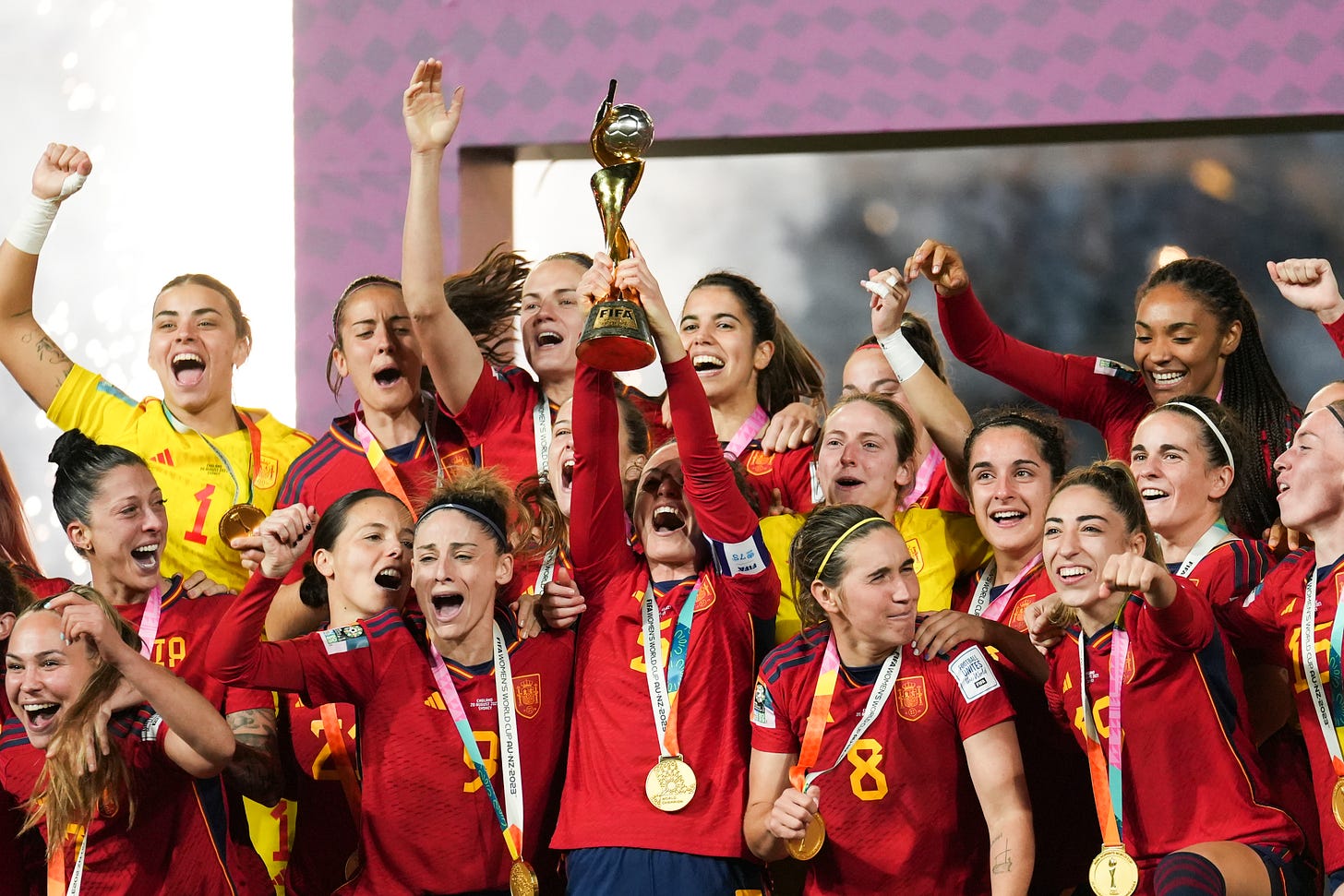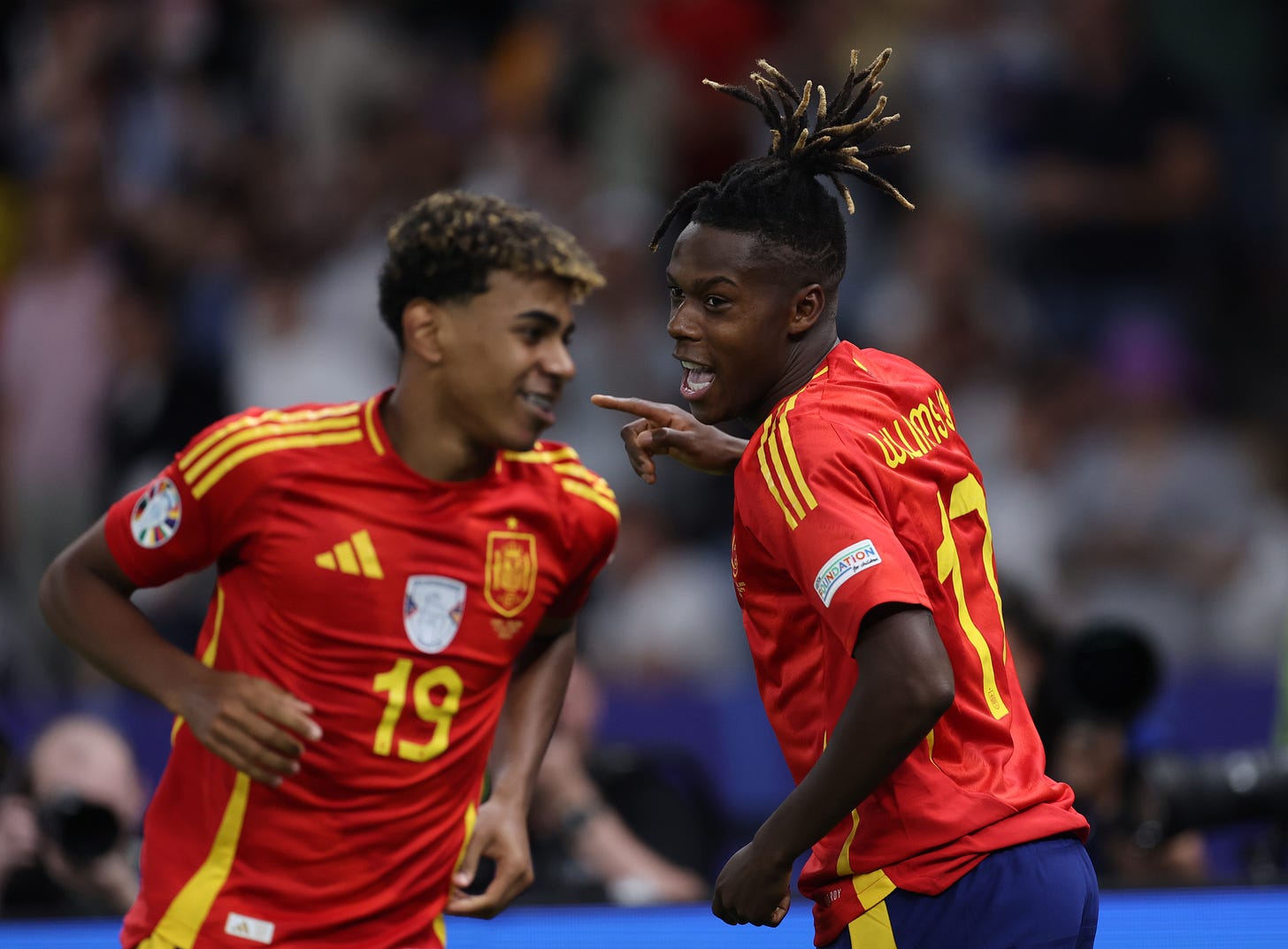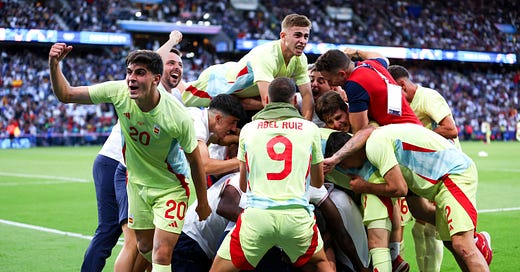Euro 2024, Olympic gold, women's World Cup: why are Spain so good at football?
Spain's summer of success on the football field follows on from last year's triumph in the Women's World Cup and is the culmination of decades of hard work and growth

Spain added Olympic gold to their Euro 2024 triumph on Friday to round off a spectacular summer on the football field. La Roja’s men have taken the two top prizes on offer at international level, following on from the success of last year’s win for the women at the World Cup. Coincidence? Not all all.
So why are Spain so good? After all, it hasn’t always been this way. In the 1980s and 1990s, the men’s national team were seen as perennial underachievers, regularly arriving as favourites to the major tournaments but flattering to deceive when it mattered most.
Heading into the 1990s, Spain had only won one major prize in men’s football and that came on home soil at the European Nations’ Cup in 1964. Home advantage was a big deal back then, much more than now, and it was only a four-team tournament. By 1964, a number of top teams – including West Germany – had also not even entered.
Recent successes have been much more emphatic. Spain’s Euro 2024 triumph was fitting reward for the tournament’s standout side, which registered six wins out of six. Likewise La Roja’s women in last year’s World Cup as they overcame challenging circumstances off the pitch to take the title, beating European champions England in the final. And at the Olympics it was a similar story: five wins out of six and a thrilling 5-3 extra-time victory over hosts France in the final. Spain’s men had lost to Egypt in their final group game, but only after making wholesale changes to the starting line-up with qualification for the knockout stages already sealed.

This latest success means Spain are now reigning champions in the Women's World Cup, Men’s Euros, Men’s Nations League, Women’s Nations League, Women’s U-20 World Cup, Women’s U-17 World Cup, Women’s U-17 Euros, Women’s U-19 Euros and Men’s U-19 Euros. Incredible.
Some of the ingredients for that unprecedented success were already there. Spain is a sports-mad nation, with no less than four national daily sports newspapers. Of those, Marca was for many years the best-selling newspaper in the entire country. And football is a huge deal all across España, with Real Madrid and Barcelona arguably the two biggest clubs in the world and those two spearheading one of Europe’s strongest leagues, featuring top teams from north to south.
But before the 1990s, none of that was really reflected in the results of the national team. Spain still produced some special players and La Roja were good, but they weren’t winning. Interestingly, it was the Olympic Games which helped to transform the landscape of Spanish sport. Barcelona ‘92 changed everything.
Hosting the Games saw unprecedented investment in Spanish sport and also brought historic results, with 22 medals picked up by the Iberian nation in Barcelona. And one of those came in men’s football. It was the start of something special.

It still took Spain until 2008 to add another major prize in international football, with La Roja winning the European Championship that summer. Key to that triumph and the team’s upturn in fortunes was coach Luis Aragonés’ decision to change the style to a possession and passing philosophy. Finally, Spain were playing to their strengths and – with Vicente del Bosque in charge after Euro 2008 – embarked on a period of spectacular success which brought a World Cup win in 2010 and another contintental crown in 2012.
A decade on from their 2012 win, Spain slumped at the 2022 World Cup, losing to Morocco on penalties in the last 16. Much of the analysis centred on a seemingly average generation of players. Apart from Rodri, where were the world-class footballers? Two years on, that seems silly. Spain’s current crop are just fine and scarily for everyone else, many of those players will be around for another decade or more.
Rodri aside, Spain’s side at Euro 2024 may have lacked the midfield mastery of their 2008-2012 vintage, but players like Xavi, Andrés Iniesta and Sergio Busquets don’t come around every few years. Instead, this team’s two stars were wingers: Lamine Yamal and Nico Williams. The former was born on the outskirts of Barcelona to a Moroccan father and an Equatorial Guinean mother; the latter the son of Ghanaian parents who had travelled to Europe, largely on foot, in search of a better life. This was a triumph for a new, modern, multicultural Spain.
Of the players in the men’s Olympic football final, seven of Spain’s starting XI came through Barcelona’s La Masia academy, which was also the base for La Roja’s remarkable run of titles between 2008 and 2012 and for the women’s team which won the World Cup in 2023.

The rivalry between Barcelona and Real Madrid has pushed those teams to greater heights and that extends to youth development. And all over the country, other clubs with fewer resources have had to focus on their youth academies in order to compete. Athletic Club, which only fields players born or raised in the Basque regions, and Real Sociedad, are two notable examples. Those two clubs provided the scorers in the final of Euro 2024, with Athletic’s Nico Williams and La Real’s Mikel Oyarzabal the players on target in the 2-1 win over England.
Real Sociedad are based in the city of San Sebastián, which forms part of the Gipuzkoa province. It is the smallest in the whole of Spain, yet has provided some of the best coaches in Europe, including Bayer Leverkusen’s Xabi Alonso, Arsenal’s Mikel Arteta, Aston Villa’s Unai Emery, Bournemouth’s Andoni Iraola, West Ham’s Julen Lopetegui and La Real boss Imanol Alguacil.
Then there’s Pep Guardiola. A cerebral midfielder in the gold medal-winning Spain side of 1992, the Catalan’s coaching philosophy has revolutionised modern football. And although La Roja’s Euro 2008 win came in the same summer Pep was appointed as Barcelona’s first-team coach, his ideas have helped Spain’s style to evolve and the national team has also benefited from his development of players – from the likes of Xavi, Iniesta, Busquets and Pedro at Barça through to Rodri at Manchester City.
Across Spain, the pathway for coach development is both superior and far more accessible compared to countries like England. While formations and systems will differ slightly, there is a clear style of play across the board: ball-playing defenders; midfield control and possession; forwards with technique and awareness to complement pace and power. In total, there are around 15,000 UEFA A or Pro Licence coaches across Spain, which is about 10 times the amount in England. And attaining the qualification comes at a fraction of the price.

After Spain’s win over France, LaLiga’s Director of International Relations Keegan Pierce wrote on X (formerly Twitter): “The pillars of Spanish fútbol’s success: That winning mindset / Grassroots talent pipeline Strength of domestic league + clubs.”
The winning mindset is helped by the exploits of Real Madrid and Barcelona, but also the rest of LaLiga. Impressively, Spain’s clubs have won all of their 22 finals against international opposition since 2001. It took a while for that success to be replicated with the national team, but these days Spain know they can win and expect to do so.
All of those factors have contributed to the results seen not only this last month, but also over the past couple of decades at youth and full international level. As seasoned Spanish football writer Sid Lowe said on X with suitable understatement on Friday night: “Spain: quite good at this football thing.” This summer has highlighted just how good.




I will also add that Joseph Guardiola emergence as the Barca first team coach in 2008 has really helped Spain. They imbibed the high pressing game style favoured by Guardiola and which incidentally bore fruits wherever he goes.